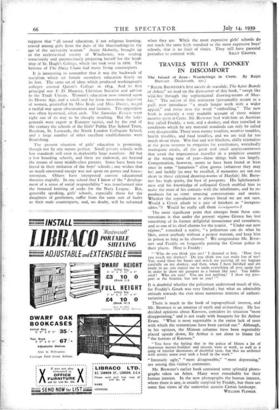TRAVELS WITH A DONKEY IN DISCOMFORT
The Island of Zeus : Wanderings in Crete. By Ralph Brewster. (Duckworth. 15s.) " RALPH BREWSTER'S first succes de scandale, The 6,000 Beards of Athos," we read on the dust-cover of this book, " swept like
wild-fire through the sophisticated drawing-rooms of May- fair." The author of this statement (presumably meant as a puff) now introduces "a much longer work with a wider appeal," and twice uses the word " enthralling." The new
book is certainly a very readable account of three winter months spent in Crete. Mr. Brewster had with him an Austrian boy called Freddy, a tent, and a donkey, and they travelled in
conditions which by any material standards can only be called very disagreeable. There were money troubles, weather troubles, health troubles, and food troubles, and we are told far too much about them. Wet feet and wet blankets, chilly rejoinders at the poste restante to enquiries for remittances, wretchedly inadequate meals, all the great and small unpleasantnesses that await the impecunious traveller in a primitive country at the wrong time of year—these things bulk too largely. Compensation, however, seems to have been found at least once in some " luxurious " olive groves (whatever they may be) and luckily (as may be recalled, if memories are not.too short in those calcined drawing-rooms of Mayfair) Mr. Brew- ster has high spirits, the best of passports. His lighthearted- ness and his knowledge of colloquial Greek enabled him to make the most of his contacts with the inhabitants, and he re- produces for us some amusing conversations and stories.
Whether the reproduction is always literal we are not sure.
Would a Greek allude to a pair of knickers as " inexpres- sibles "? Would he really call them tii4K4pao-rot. ?
The most significant point that emerges from these con- versations is that under the present regime Greece has lost something of its former delightful insouciance and casualness, and so one of its chief charms for the tourist. " Under our new regime," remarked a native, " a policeman can do what he likes, arrest anybody without a proper warrant, and keep him in prison as long as he chooses." We congratulate Mr. Brew- ster and Freddy on frequently putting the Cretan police in their places. Here is Freddy :
" Who do you think you are? ' I shouted at him. How dare you touch my donkey? Do you think you can make fun of me? You stand there for hours and watch me packing all my luggage carefully on my donkey, and then, when I have finished and am ready to go, you expect me to undo everything all over again just in order to show my passport to a button like you! You fiddle- stick! Who are you? You are just nothing! I show my pass- port at the frontier, but not to you! ' "
It is doubtful whether the policeman understood much of this, for Freddy's Greek was very limited ; but what an admirable attitude towards the ever more numerous minions of authori- tarianism!
There is much in the book of topographical interest, and Mr. Brewster is an amateur of myth and archaeology. He has decided opinions about Knossos, considers its situation "most disappointing," and is not ready with bouquets for Sir Arthur Evans. " What is most regrettable is the entire lack of taste with which the restorations have been carried out." Although, in his opinion, the Minoan columns have been regrettably placed upside down, Sir Arthur is not alone to blame for "the horrors of Knossos."
" You have the feeling that in the palace of Minos a lot of ingenious master-builders and masons were at work, as well as a gang of interior decorators of doubtful taste, but that no architect with artistic sense ever took a hand in the work."
" Intensely ugly," " most disagreeable," " most depressing," are among this visitor's comments.
Mr. Brewster's earlier book contained some splendid photo- graphs taken on Athos. Many were remarkable for their human interest. In the new photographs the human interest, where there is any, is usually supplied by Freddy, but there are some fine views of the somewhat austere Cretan landscape.
WILLIAM PLOMER.










































 Previous page
Previous page